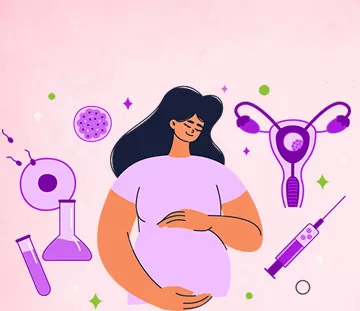The Importance of Post IVF Precautions
The days and weeks after the embryo transfer are critical to establishing a healthy pregnancy. The body goes through significant changes, and extra care is essential to optimize the environment for embryo implantation and development. There are many precautions to be taken after IVF that play a vital role in reducing the risk of complications and increasing the likelihood of a successful outcome.
After IVF what precautions should be taken?
1. Rest and Physical Activity
Rest is crucial after the embryo transfer, but complete bed rest is not recommended. It’s essential to strike a balance between resting and light activity.
- Rest for the first 48 hours : After embryo transfer, it is advisable to take it easy for the first 48 hours. This allows your body to adjust and provides the embryo with the best chance to implant.
- Avoid strenuous physical activity : Activities that cause intense exertion should be avoided for at least two weeks. High-impact exercises, heavy lifting, and anything that increases abdominal pressure should be postponed.
- Light movement is encouraged : Gentle walking and simple household tasks can be beneficial as they promote circulation without causing stress on the body.
| Activity | Why to Avoid | Alternative |
|---|---|---|
| Heavy lifting | May increase abdominal pressure | Light walking and gentle stretches |
| Intense exercise | Puts stress on the body, hindering implantation | Gentle yoga or relaxation exercises |
| Traveling long distances | Can increase stress and fatigue | Postpone non-urgent travel until the second trimester |
2. Dietary Precautions After IVF Pregnancy
A balanced and nutritious diet supports the body in maintaining a healthy pregnancy. Here's a breakdown of dietary precautions after IVF pregnancy to keep in mind:
- High-protein diet : Foods rich in protein like lean meat, eggs, and legumes are essential for supporting the development of the embryo.
- Hydrate adequately : Drinking plenty of water helps in keeping the body hydrated and flushing out toxins.
- Avoid alcohol, caffeine, and smoking : These substances can interfere with fetal development.
- Incorporate folic acid : A prenatal vitamin with folic acid is important as it helps prevent neural tube defects in the developing baby.
3. Emotional Well-being
Stress and anxiety can negatively impact fertility and pregnancy outcomes. Managing your emotional health is just as important as physical care:
- Practice relaxation techniques : Mindful breathing, meditation, and yoga (with doctor’s approval) can help reduce anxiety.
-
Seek support : IVF can be emotionally taxing. Engage with a support group or a counselor to talk through your concerns and feelings.
4. Don’t Skip Medications
It’s crucial to adhere strictly to the medication regimen prescribed by your fertility specialist. These medications help support the pregnancy and include hormonal support such as progesterone.
- Follow the schedule : Whether it’s injections or oral medications, follow the prescribed schedule without missing doses.
- Report any side effects : If you experience any unusual symptoms or side effects, inform your doctor immediately.
5. Monitor Symptoms
After IVF, it’s normal to experience some mild symptoms. However, certain symptoms may indicate complications that require immediate attention:
- Normal symptoms : Mild cramping, spotting, or bloating are common and usually not a cause for concern.
- Warning signs : Heavy bleeding, severe pain, or fever could indicate complications such as ovarian hyperstimulation syndrome (OHSS) or ectopic pregnancy . Contact your doctor immediately if you experience these.
6. Intimacy Post IVF
Your doctor may advise you to avoid sexual intercourse for a short period post-IVF. This is to minimize any physical strain or increase in abdominal pressure that could affect the implantation process. Always follow your doctor’s recommendations regarding when it's safe to resume intimacy.
IVF Pregnancy Precautions: During the Early Stages
As your pregnancy progresses, certain IVF pregnancy precautions must be taken to ensure a smooth and healthy pregnancy:
- Regular check-ups : Frequent visits to your fertility specialist are necessary to monitor the progress of the pregnancy and ensure everything is proceeding normally.
- Ultrasound scans : Early ultrasounds are crucial in confirming a viable pregnancy and ruling out any complications such as an ectopic pregnancy.
-
Blood tests : These tests monitor hormone levels and other markers essential for a healthy pregnancy.
Lifestyle and Dietary Precautions to Take After IVF
1. Maintain a Healthy Sleep Routine
Sleep is essential for healing and supporting the early stages of pregnancy:
- Aim for 7-9 hours of sleep : Proper sleep helps reduce stress and supports the body’s natural processes.
- Create a relaxing bedtime routine : Reduce screen time, practice mindfulness, or read a book before bed to help your body relax.
2. Dietary Do’s and Don’ts
- Do consume fiber-rich foods : Prevent constipation, which is common during early pregnancy, by eating plenty of whole grains, vegetables, and fruits.
-
Don’t eat undercooked or raw foods : Avoid sushi, raw eggs, and undercooked meats to prevent infections that could affect pregnancy.
3. Hydration
Proper hydration is key to supporting your body post-IVF. Drink ample amount of water daily, and avoid sugary or carbonated beverages.
Understanding Implantation and the Two-Week Wait
The period after the embryo transfer is often referred to as the "two-week wait" before you can confirm pregnancy through a blood test. This time is filled with anticipation and careful attention to precautions to be taken after IVF:
- Avoid high-stress situations : Mental and emotional stress can impact the success of implantation.
- Don’t take a pregnancy test too early : The urge to test early can be strong, but it’s best to wait until the recommended time to avoid false results.
- Take progesterone as prescribed : This hormone is crucial in maintaining the uterine lining and supporting early pregnancy.
Ensuring Success After IVF
The journey after IVF requires careful attention to both physical and emotional health. By following the recommended precautions after IVF pregnancy, you give your body the best chance of maintaining a healthy pregnancy and reducing the risk of complications. While every individual’s experience may vary, general post-IVF precautions—from adequate rest, healthy eating, to emotional support—play a vital role in the success of IVF treatment.
With the right precautions in place, and regular consultation with your fertility specialist, you can help safeguard your pregnancy and continue on the path toward becoming a parent. Remember, your body has already been through a lot, and by practicing these precautions to be taken after IVF, you are giving yourself the best possible chance for success.
Pregnancy Calculator Tools for Confident and Stress-Free Pregnancy Planning
Get quick understanding of your fertility cycle and accordingly make a schedule to track it















